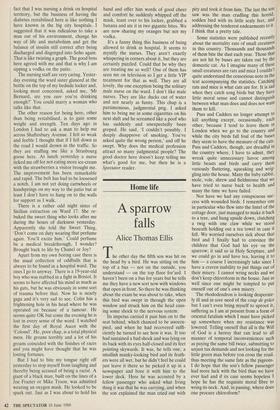Home life
A sparrow falls
Alice Thomas Ellis
The other day the fifth son was hit on the head by a bird. He was sitting on the top of a bus — not on the outside, you understand — on the top floor for'ard. I haven't been on a bus for years but he tells me they have a new sort now with windows that open in front. So there he was thinking about the exam he was about to take, when this bird was swept in through the open window and struck him on the head caus- ing some shock to the nervous system.
Its impetus carried it past him on to the seat behind, which chanced to be unoccu- pied, and when he had recovered suffi- ciently he turned to see how it was. It too had sustained a bad shock and was lying on its back with its eyes half-closed and its feet pointing skywards. It was, he tells one, a smallish manky-looking bird and its feath- ers were all wet, but he didn't feel he could just leave it there so he picked it up in a newspaper and bore it with him to the lower deck. Here he was accosted by a fellow passenger who asked what living thing it was that he was carrying, and when the son explained the man cried out with pity and took it from him. The last the son saw was the man cradling this horrid, sodden bird with its little scaly feet, and addressing the tenderest endearments to it. I think that a pretty tale.
Some statistics were published recently about the mortality rate of small creatures in this country. Thousands and thousands of them bite the dust each year. Those that are not hit by buses are taken out by the domestic cat. As I imagine many of these small creatures are rats and mice I couldn't quite understand the censorious note in the text accompanying the statistics. Catching rats and mice is what cats are for. It is sad when they catch song birds but they have little moral sense and cannot distinguish between what man does and does not want them to kill.
Puss and Cadders no longer attempt to kill anything except, occasionally, each other, because I tend to leave them in London when we go to the country and while the city birds fall foul of the buses they seem to have the measure of the cats. Puss and Cadders, though, are dreadful in the country where, I have to admit, they wreak quite unnecessary havoc among little beasts and birds and carry them variously fluttering, squeaking and wrig- gling into the house. Many the baby rabbit, mole, vole, shrew and fieldmouse that we have tried to nurse back to health and many the time we have failed.
Nor have we had any conspicuous suc- cess with wounded birds. I remember one in particular who flew into the lintel of the cottage door, just managed to make it back to a tree, and hung upside down, clutching a twig with one claw while we stood beneath holding out a tea towel in case it fell. We worried ourselves sick about that bird and I finally had to convince the children that God had his eye on the sparrow; it said so in Holy Scripture, and we could go in and have tea, leaving it to him — a course I increasingly take since I have a craven inability to put things out of their misery. I cannot wring necks and we don't keep chloroform in the house. Just as well since one might be tempted to put oneself out of one's own misery.
The rhododendron is looking desperate- ly ill and in sore need of the coup de grace but I can't even bring myself to uproot it, suffering as I am at present from a form of oriental fatalism which I must have picked up somewhere when my resistance was lowered. Telling oneself that all is the Will of God is a heresy that can lead to all manner of temporal inconveniences such as paying the same bill twice, submitting to unjust tax demands and not looking for the little green man before you cross the road, thus meeting the same fate as the pigeons. I do hope that the son's fellow passenger had more luck with the bird than we have ever had and if its case seems hopeless I hope he has the requisite moral fibre to wring its neck. And, in passing, where does one procure chloroform?


















































 Previous page
Previous page